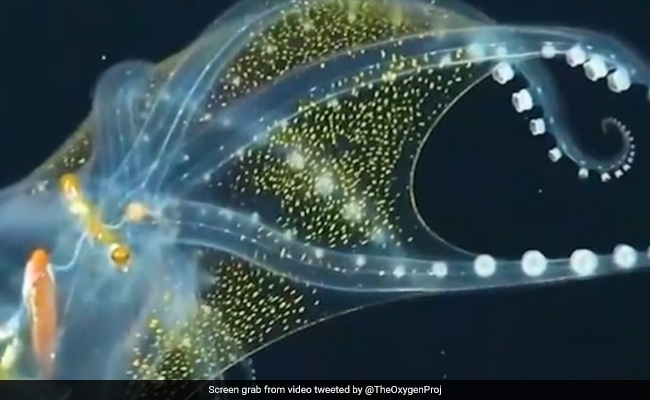
These mysterious creatures live for about 2-5 years.
Nature never ceases to amaze you. One such spectacular phenomenon of nature was captured in a video which is now going viral. A short clip posted on Twitter shows a rare species of glass octopus, Vitreledonella richardi, floating in the sea.
The video was posted by ‘The Oxygen Project’ and it features a marine creature living deep down in the vast ocean. As the name suggests, the ‘glass’ octopus is as clear as glass and one can only see its nerves, eyes and digestive tract. The Vitreledonella richardi evolved to be nearly transparent in order to hide from predators to the best of their ability, according to Oceaninfo. The glass octopus resides deep down in the ocean where sunlight cannot reach.
Along with the video, the caption reads, “The glass octopus (Vitreledonella richardi) is a very rarely seen cephalopod found in tropical and subtropical waters around the world. These beautiful creatures are found in the deep sea where sunlight doesn’t reach.”
Watch the video here:
Happy belated #WorldOctopusDay! 🐙
The glass octopus (Vitreledonella richardi) is a very rarely seen cephalopod found in tropical and subtropical waters around the world. These beautiful creatures are found in the deep sea where sunlight doesn’t reach.
Video by @SchmidtOceanpic.twitter.com/fXgYPYDSUG
— The Oxygen Project (@TheOxygenProj) October 9, 2022
So far, the video has amassed more than 19,000 views. After watching the video, internet users were left fascinated. A user wrote, “The definition of the development of life is seen in the sea itself.” Another wrote, “They’re also so clear as glass that you can see their nerves and digestive tract. Their appearance is camouflaged, and this ability will protect them from attack.”
“Wow! What a great job you guys have,” the third user commented.
According to the International Union for Conservation of Nature, glass octopuses were not discovered until 1918. It is usually found in tropical and subtropical regions in the vast ocean. These mysterious creatures live for about 2-5 years.
It has a mantel of around 4.3 inches or 11 cm in length. The total length of an adult specimen is around 18 inches or 45 centimetres, reported Oceaninfo. It has 8 tentacles.
Click for more trending news
Hits: 0













